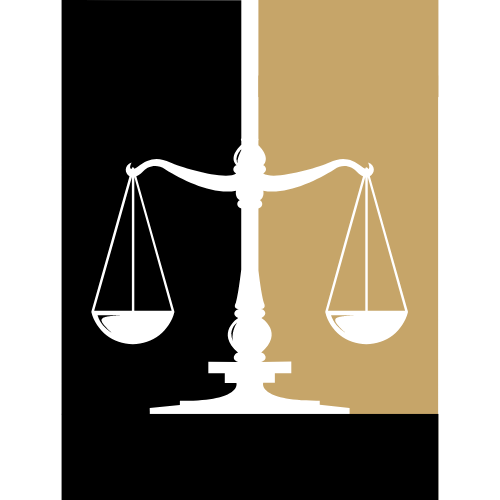Did you know over 10 million criminal cases are filed in the U.S. each year? Understanding your legal rights is key to protecting yourself in the complex criminal justice system. This article will guide you through the essential rights you have in criminal cases. It aims to empower you to stand up for your rights and protect your freedoms.
We will delve into key areas like due process, Miranda rights, and the right to an attorney. We’ll also cover the presumption of innocence, the right to a fair trial, and search and seizure laws. Additionally, we’ll discuss the right against self-incrimination, rules of evidence, and the appeals process. These rights are crucial for anyone facing criminal charges or dealing with law enforcement. They are the foundation of a fair and just criminal justice system.
Key Takeaways
- The U.S. Constitution and Bill of Rights establish crucial legal rights for individuals in criminal cases.
- Due process and the right to a fair trial are fundamental principles that ensure a just legal system.
- Miranda rights protect the right to remain silent and the right to an attorney during police questioning.
- The presumption of innocence and the government’s burden of proof are essential safeguards for the accused.
- Search and seizure laws, the right against self-incrimination, and rules of evidence help protect individual privacy and rights.
Introduction to Legal Rights in Criminal Cases
In the criminal justice system, people accused of crimes have many legal rights. These rights protect their interests and ensure a fair trial. They come from the U.S. Constitution and have been shaped by laws and court decisions.
Knowing and using these rights is crucial for those facing criminal charges. They can greatly affect the outcome of a case.
Understanding the Importance of Protecting Your Rights
The due process and presumption of innocence are key in the U.S. criminal justice system. They make sure accused people are treated fairly and with respect. By knowing and using your rights, you can avoid unfair treatment and ensure a fair trial.
Overview of Rights in the Criminal Justice System
Some important legal rights in criminal cases include:
- The right to a fair and speedy trial
- The right to be presumed innocent until proven guilty
- The right to remain silent and not self-incriminate
- The right to be represented by an attorney
- The right to challenge the admissibility of evidence
- The right to appeal a conviction
Protecting these rights is vital for the integrity of the criminal justice system. It also safeguards the rights of individuals facing criminal charges.
“The protection of individual rights has been the most cherished purpose of the criminal justice system.”
– Earl Warren, former Chief Justice of the United States Supreme Court
Due Process and the Right to a Fair Trial
The U.S. Constitution promises everyone the right to due process of law. This means the government must treat all fairly and follow legal steps. This right is key in the criminal justice system, where it ensures a fair trial for defendants.
The right to a fair trial lets those accused to present their case. They can face witnesses and get a fair judgment from a jury or judge. This right keeps the legal system fair and protects the accused, upholding justice and equality.
- The right to a fair trial is in the Fifth and Fourteenth Amendments to the U.S. Constitution.
- It makes sure the government follows the right steps and treats everyone fairly in the criminal justice system.
- This right also means being able to show evidence, question witnesses, and have a fair decision-maker.
Keeping the right to a fair trial is key to ensuring due process and protecting the accused’s rights. By upholding these legal principles, the criminal justice system stays strong. It helps ensure justice is fairly administered.
“The right to a fair trial is a cornerstone of the American legal system, ensuring that no one is unjustly deprived of their liberty.”
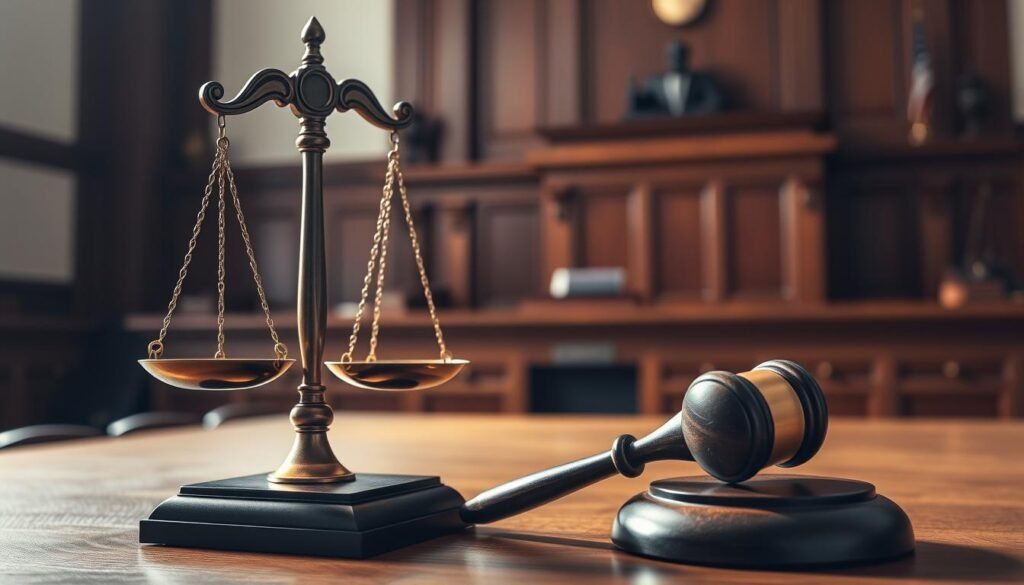
Miranda Rights and the Right to Remain Silent
The Miranda rights are key for people facing criminal charges. They protect your Fifth Amendment right against self-incrimination. Law enforcement must tell you about your right to remain silent and get an attorney before questioning.
Invoking Your Miranda Rights During Questioning
It’s important to know and use your Miranda rights when questioned. Saying, “I invoke my right to remain silent” or “I want a lawyer,” protects you. It stops any statements you make from being used against you in court.
Consequences of Waiving Your Miranda Rights
Not using your Miranda rights can lead to big problems. If you give up your right to remain silent and say something that incriminates you, it can be used against you. Knowing your rights and using them is crucial to protect yourself.
“Anything you say can and will be used against you in a court of law.”
This part of the Miranda warning is very important. It shows why it’s key to use your Miranda rights. By doing so, you protect your right to remain silent and make sure the legal process is fair.
| Miranda Rights | Explanation |
|---|---|
| Right to Remain Silent | You have the right to refuse to answer questions or provide any information to law enforcement. |
| Right to an Attorney | You have the right to have an attorney present during any questioning or interrogation. |
| Right to Appointed Counsel | If you cannot afford an attorney, one will be appointed to represent you at no cost. |
The Right to an Attorney
In the United States, the Sixth Amendment to the Constitution guarantees the fundamental right to an attorney during criminal proceedings. This means defendants have the right to legal counsel. They can choose their own attorney or get a public defender if they can’t afford one. This right is key to understanding the criminal justice system and getting a fair outcome.
Accessing Legal Representation and Public Defenders
Defendants can ask for an attorney at any time in the criminal process. This includes from the arrest to the trial and appeal. If they can’t afford a private attorney, the court must appoint a public defender for free. Public defenders are skilled attorneys who focus on criminal defense and help those who can’t pay.
| Characteristic | Private Attorney | Public Defender |
|---|---|---|
| Cost | Paid by the defendant | No cost to the defendant |
| Expertise | Varies based on attorney | Specializes in criminal defense |
| Caseload | Typically lower | Often higher, but dedicated to clients |
Whether a defendant picks a private attorney or a public defender, the right to legal representation is vital. It protects their interests and ensures a fair trial.
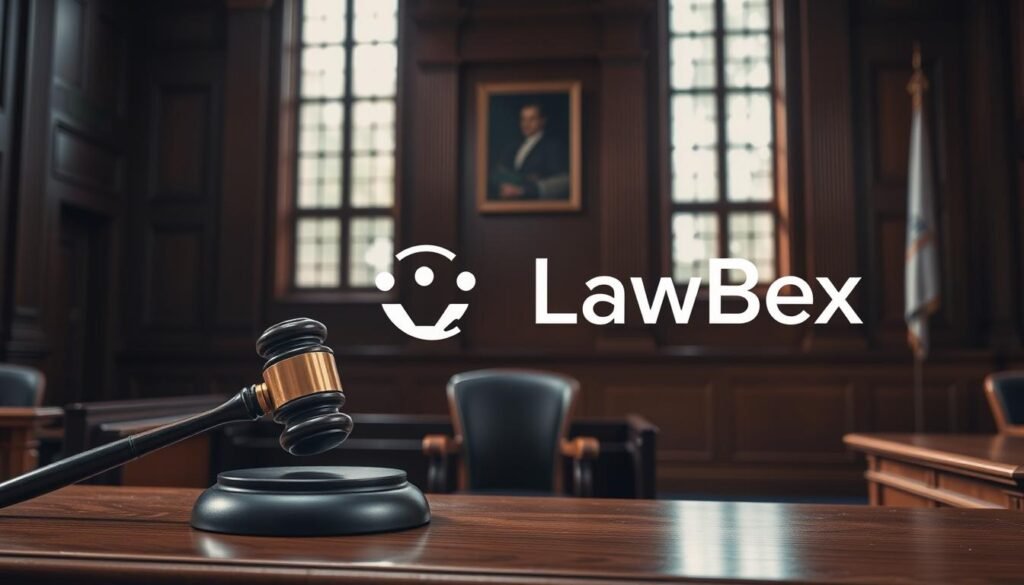
Presumption of Innocence and the Burden of Proof
In the criminal justice system, a key principle is the presumption of innocence. This means people accused of a crime are seen as innocent until proven guilty. The prosecution must show the defendant’s guilt beyond a reasonable doubt. This high standard helps prevent innocent people from being wrongly convicted.
The presumption of innocence is a crucial protection against unfair convictions. It makes the government responsible for proving a case, not the defendant. This idea is based on the belief that it’s better for a guilty person to be free than for an innocent one to be wrongly punished.
Keeping the presumption of innocence is vital for protecting the accused’s rights and the justice system’s integrity. It ensures people are not imprisoned unless the evidence against them is clear and leaves no doubt. This is how the system protects the innocent and holds the guilty accountable.
| Presumption of Innocence | Burden of Proof |
|---|---|
| A fundamental legal principle that requires the government to prove a defendant’s guilt beyond a reasonable doubt. | The obligation placed on the prosecution to establish the defendant’s guilt through compelling and conclusive evidence. |
| Ensures that individuals are not convicted unless the evidence against them is overwhelmingly compelling. | Ensures that innocent people are not wrongfully convicted due to a lack of sufficient evidence. |
| Protects the rights of the accused and maintains the integrity of the criminal justice system. | Upholds the principle that it is better for a guilty person to go free than for an innocent person to be unjustly punished. |
By upholding the presumption of innocence and the burden of proof, the criminal justice system protects the accused’s rights and ensures justice. These principles are key to keeping the innocent safe and the guilty accountable. They make sure justice is served fairly and in line with the law.
Search and Seizure Laws: Protecting Your Privacy
The Fourth Amendment is key in keeping our privacy safe. It stops the government from doing unreasonable searches and seizures. Law enforcement needs a good reason and a warrant to search most places. Knowing these laws helps protect our basic rights.
Understanding the Fourth Amendment Protections
The Fourth Amendment says we have the right to be safe from unreasonable searches and seizures. This means the government needs a good reason and a warrant to search our homes or take our stuff. There are some exceptions, but they are rare and need a strong reason.
This protection isn’t just for our homes. It also covers our personal info, messages, and digital devices. Law enforcement must be careful not to cross our rights. Knowing the details of search and seizure laws is key to keeping our privacy and freedom safe.
“The right of the people to be secure in their persons, houses, papers, and effects, against unreasonable searches and seizures, shall not be violated, and no Warrants shall issue, but upon probable cause, supported by Oath or affirmation, and particularly describing the place to be searched, and the persons or things to be seized.” – The Fourth Amendment to the U.S. Constitution
By following the Fourth Amendment, we protect our rights and keep the government from invading our privacy without reason. Learning about search and seizure laws helps us stand up for our rights and keep our privacy safe.
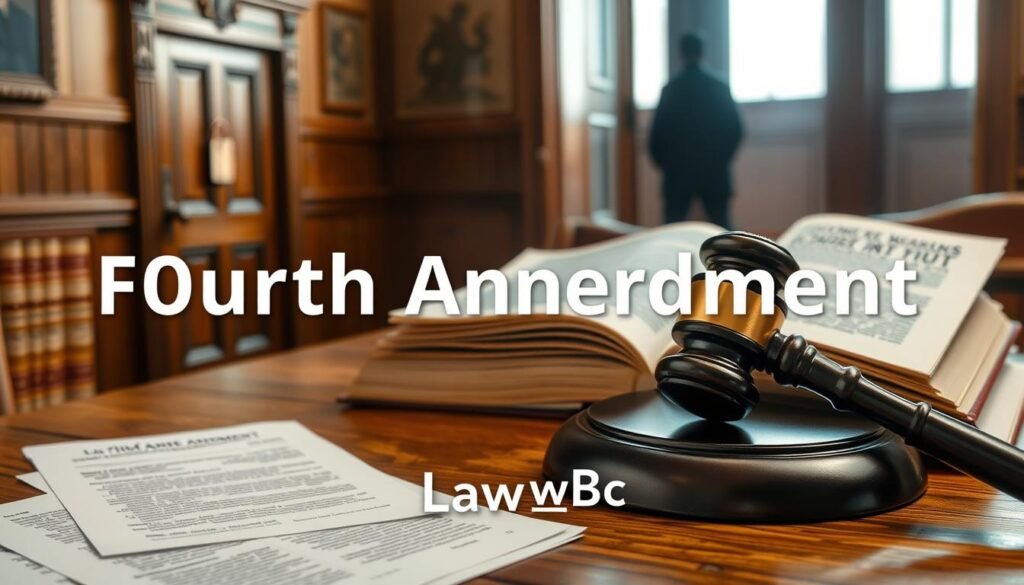
The Right Against Self-Incrimination
The Fifth Amendment to the U.S. Constitution gives people a key right against self-incrimination. This right, also called the privilege against self-incrimination, lets defendants not answer questions that could hurt them in court.
This right is vital in the criminal justice system. It keeps people from being forced to say things that could make them look guilty. It helps make sure trials are fair and that everyone is presumed innocent until proven guilty.
There are different ways to use this right, such as:
- Declining to answer questions during police interrogation
- Refusing to provide documents or other evidence that could be self-incriminating
- Choosing not to testify in one’s own defense at trial
By using this right, people can avoid giving information that could harm them. This makes sure the government can’t force people to help build a case against them. It helps make things fair.
“The privilege against self-incrimination is a fundamental human right, essential to our system of constitutional rule and the maintenance of a fair state-individual balance.”
Knowing and using the right against self-incrimination is very important. It’s a big part of keeping our legal system fair and just. It makes sure everyone gets a fair chance in court.
Rules of Evidence and Admissibility in Court
In the pursuit of justice, the rules of evidence are key. They ensure fairness and integrity in criminal trials. These rules dictate what information can be used in court and how it’s used to build a case. It’s vital for prosecutors and defense attorneys to understand relevance, reliability, and admissibility.
Relevance and Reliability of Evidence
The admissibility of evidence hinges on relevance and reliability. Relevant evidence directly impacts the case, proving or disproving charges. Reliable evidence is trustworthy and can be backed up by credible sources.
- Relevance: Evidence must relate to the case. It should help decide guilt or innocence.
- Reliability: Evidence must be trustworthy. This includes factors like the chain of custody and expert testimony.
By examining evidence’s relevance and reliability, courts ensure fairness. They only consider the most important and trustworthy information.
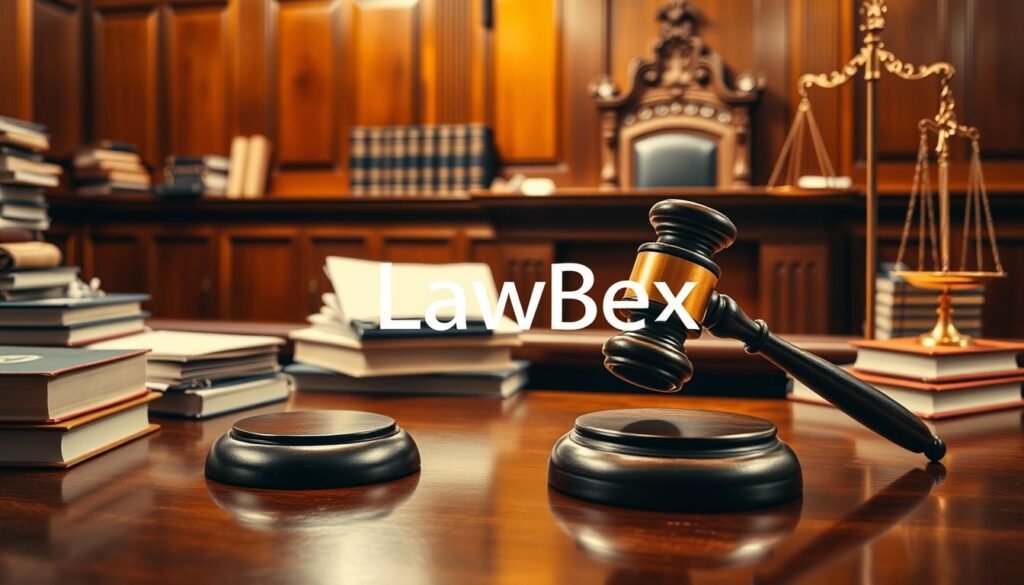
“The rules of evidence are designed to ensure that only relevant and reliable information is presented in a court of law, protecting the integrity of the judicial process.”
The rules of evidence and admissibility are crucial in the criminal justice system. They uphold due process and the presumption of innocence.
Legal Rights in Criminal Cases: Protecting Your Fundamental Rights
In the criminal justice system, our legal rights protect us as individuals. These rights, found in the U.S. Constitution and laws, make sure we’re treated fairly. They apply, no matter what we’re accused of.
The presumption of innocence is a key right. It means we’re seen as innocent until proven guilty. The prosecution must prove our guilt with strong evidence.
We also have the right to a fair and speedy trial. This ensures we get to present our case and face any evidence against us. Having a lawyer helps protect our rights during the trial.
The right against self-incrimination is crucial too. It means we can’t be forced to say anything that could hurt us. We can choose to stay silent, especially without a lawyer.
“The legal rights in criminal cases are not just technicalities, but essential safeguards that protect our most fundamental freedoms.”
Knowing and using these legal rights in criminal cases helps protect our fundamental rights. These rights are vital for a fair and just legal system.
Appeals Process and Challenging Convictions
If you’ve been convicted of a crime, you have the right to appeal. The appeals process lets you review legal errors from your trial. This could lead to your conviction being overturned or a new trial.
Grounds for Appeal and Post-Conviction Relief
There are several reasons you can appeal your conviction. These include:
- Legal errors – Mistakes in the law that might have changed the trial’s outcome.
- Juror misconduct – If the jury acted unfairly or was influenced by outside factors.
- Ineffective assistance of counsel – If your lawyer didn’t defend you well, leading to an unfair trial.
You can also seek post-conviction relief, like a habeas corpus petition. This is for issues not covered in the trial. It’s a complex process, so working with a skilled criminal defense attorney is key.
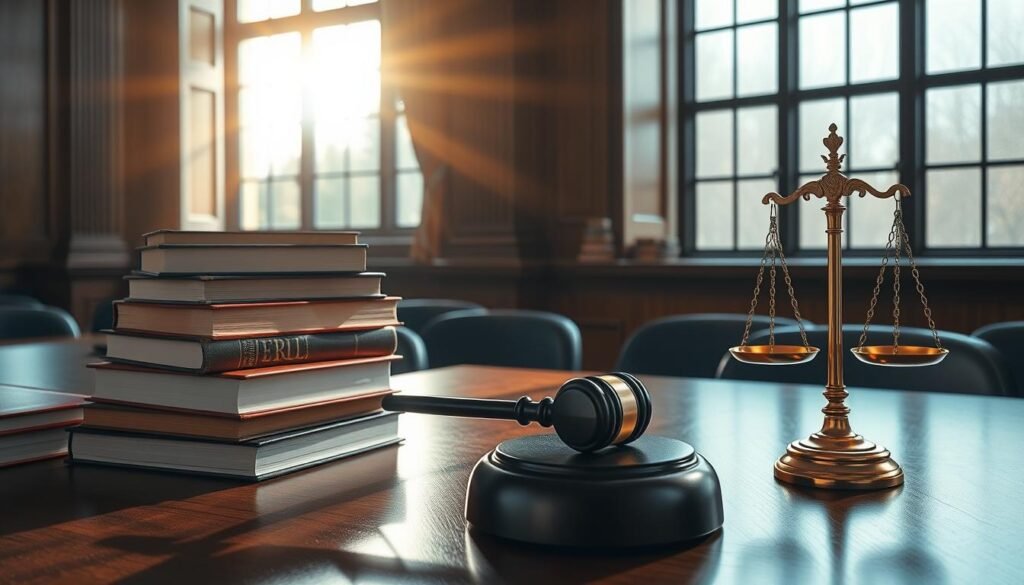
“The appeals process is a crucial safeguard in the criminal justice system, ensuring that convictions are based on sound legal principles and that everyone receives a fair trial.”
Understanding your rights and the appeals process is crucial. It lets you challenge your conviction and fight for a fair outcome. Remember, the battle for justice doesn’t stop after the trial. The appeals process is a powerful tool in your quest for justice.
Navigating the Criminal Justice System
Going through the criminal justice system can feel overwhelming. But, having a good criminal defense attorney by your side can really help. They can guide you, tell you your options, and fight for you in court.
Consulting with a Criminal Defense Attorney
If you’re facing criminal charges, getting a criminal defense attorney is key. They know the system well and can help you from start to finish. With their help, you can get a better outcome and protect your rights.
A criminal defense attorney can help in many ways:
- They explain the charges and what could happen
- They advise on what to do next, like plea bargaining or going to trial
- They do a deep investigation to find evidence and plan your defense
- They represent you in court, question witnesses, and present your case
- They fight for your rights and interests at every step
By talking to a criminal defense attorney, you can feel more confident in the system. You’ll have a better chance of a good outcome for your case.
| Benefits of Working with a Criminal Defense Attorney | Potential Drawbacks of Self-Representation |
|---|---|
|
|
Going through the criminal justice system is stressful and hard. But, with a skilled criminal defense attorney, you can feel more confident. You’ll have a better chance of a good outcome and protecting your rights.
CRIMINAL DEFENSE STRATEGIES: PROTECTING YOUR RIGHTS
Conclusion
In the United States, the legal rights of people facing criminal charges are key. They protect our freedoms and make sure the justice system is fair. Knowing and using these rights helps us deal with the criminal justice system better.
These rights include the right to a fair trial, to stay silent, to have an attorney, and to be presumed innocent. They are the base of a democratic society that respects the rights of those accused. By staying informed and getting help from a good criminal defense attorney, we can make sure our legal rights in criminal cases are respected and our rights are protected.
The value of these legal rights is huge. They prevent the misuse of power and unfair prosecution. They are a key part of the American justice system. As we face the challenges of criminal law, it’s important to keep fighting for and using these basic rights.
